 In addition to light, tropical houseplants require regular watering and humidity to thrive. Most tropical plants prefer to be kept consistently moist, but not waterlogged, so be sure to water them when the top inch of soil feels dry to the touch. To increase humidity levels, particularly in drier climates, consider misting your plants regularly or placing them on a tray of pebbles filled with water.
In addition to light, tropical houseplants require regular watering and humidity to thrive. Most tropical plants prefer to be kept consistently moist, but not waterlogged, so be sure to water them when the top inch of soil feels dry to the touch. To increase humidity levels, particularly in drier climates, consider misting your plants regularly or placing them on a tray of pebbles filled with water.
Shopping for my fiancée:
THE BRIEF: ‘My fiancée Sara is the funniest person I’ve ever met. She likes to read and watch tv. She has a cat named Jubilee whom she loves. She loves science fiction and fantasy, including Lord of the Rings, Hunger Games, Harry Potter, and Annihilation. She likes gold and silver jewelry. She is 34 years old. She likes to wear baby blue. Can you give me a list of 10 SPECIFIC gift suggestions for her?’
Studies have shown that the presence of houseplants can have a positive impact on mental health and well-being. Being surrounded by greenery has been linked to reduced stress levels, increased feelings of calmness and relaxation, and improved overall mood. Houseplants can also help to create a sense of connection to nature, which is especially important for city dwellers who may not have access to green spaces.
In addition to improving air quality, houseplants can also offer a number of health benefits. Studies have shown that indoor plants can help to reduce the incidence of colds, sore throats, and other respiratory ailments by increasing humidity levels and removing airborne pathogens.
3D garden design tools are not just beneficial for homeowners, but also for landscapers and garden designers. By creating a 3D model of the proposed garden, professionals can effectively communicate their vision to clients, ensuring that everyone is on the same page before any construction begins. This collaborative approach can lead to a more efficient and successful project, with fewer misunderstandings and revisions along the way.
The first step in creating a 3D garden design is to conduct a site survey and take accurate measurements of the outdoor space. This information will form the foundation of the design, helping to ensure that the layout is appropriate for the size and shape of the garden. By using tools such as laser levels and GPS devices, designers can capture precise data that can be imported into 3D modelling software.
As the trend of bringing the outdoors inside continues to gain popularity, tropical houseplants have become a staple in many homes across the UK. These versatile and vibrant plants not only add a touch of greenery to indoor spaces but also offer a host of benefits for both physical and mental well-being. From improving air quality to boosting mood and productivity, tropical houseplants are a must-have for any indoor plant enthusiast.
Furthermore, tropical houseplants can enhance productivity and concentration in indoor environments. Research has demonstrated that the presence of plants in workspaces can improve focus, creativity, and cognitive function, leading to increased productivity and efficiency. By creating a more inviting and naturalistic atmosphere, tropical houseplants can help individuals feel more connected to their surroundings and motivated to work.
Some popular tropical houseplants for indoor spaces include the Monstera deliciosa, known for its large, glossy leaves and striking Swiss cheese-like patterns. The Peace Lily, with its elegant white blooms and dark green foliage, is a popular choice for adding a touch of elegance to any room. The Snake Plant, with its upright, sword-like leaves, is a hardy and low-maintenance plant that can thrive in a variety of conditions.
Furthermore, the presence of houseplants has been linked to a range of mental health benefits, including reduced stress, improved mood, and increased productivity. The act of caring for plants can be meditative and therapeutic, providing a sense of purpose and connection to nature. In a world increasingly dominated by screens and technology, tropical houseplants offer a welcome respite and a chance to reconnect with the natural world.
Light is a crucial factor in the growth and health of houseplants. In the UK, where natural light can be scarce, it’s important to place your plants in a location where they will receive sufficient sunlight. South-facing windows are ideal for most plants, but if natural light is limited, consider supplementing with artificial grow lights.
Earlier this year, houseplants business owner Sam called time on his two-year romance with Inga Valentiner and proved he had no regrets with his new girlfriend Yasmine during their romantic beach date.
 When selecting tropical houseplants for your home, it is essential to consider factors such as light levels, humidity, Qooh.Me and temperature. Most tropical plants thrive in bright, indirect sunlight and require regular watering to keep their soil moist but not waterlogged. Humidity-loving plants like ferns and orchids may benefit from misting or a humidifier to create the ideal growing conditions. It is also important to avoid exposing tropical houseplants to drafts, cold temperatures, or sudden changes in environment, as this can stress the plants and lead to health problems.
When selecting tropical houseplants for your home, it is essential to consider factors such as light levels, humidity, Qooh.Me and temperature. Most tropical plants thrive in bright, indirect sunlight and require regular watering to keep their soil moist but not waterlogged. Humidity-loving plants like ferns and orchids may benefit from misting or a humidifier to create the ideal growing conditions. It is also important to avoid exposing tropical houseplants to drafts, cold temperatures, or sudden changes in environment, as this can stress the plants and lead to health problems.